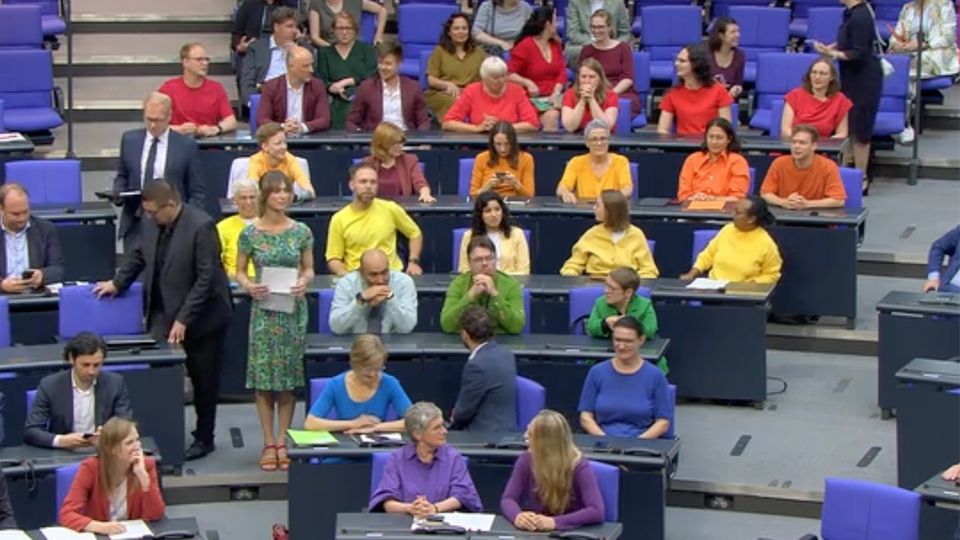

Hard no on the food, but I’m with you on Never Gonna Give You Up. I sometimes klick obvious rickrolling links just to listen to it.
I also unironically like Wonderwall.


Hard no on the food, but I’m with you on Never Gonna Give You Up. I sometimes klick obvious rickrolling links just to listen to it.
I also unironically like Wonderwall.
I sometimes also use Netzteil.
(Literally: Net thing. The net is the power grid)
Yes, please do that. So we are immediately aware that we should get away as fast as possible.


I think you would benefit from having a progressive community around you IRL, not just online. People who accept you as you are and understand your fears.
I’m guessing moving somewhere progressive to go to college isn’t an option. But you said you live close to a city. Is there maybe some group you could join there? Maybe an LGBTQ+ adjacent group? I know you are straight and cis, but some of the people there probably have experienced similar problems and allies are often welcome. Having a working support network makes things a lot less scary.


Add bogs to that list. Worldwide, bogs store more CO2 than forests. Restoring them and making sure they don’t dry up (which also would release a lot of gases harmful to the climate) would be a good way to capture CO2.
I don’t have any numbers to compare it to other techniques though, sorry.
Yeah, that’s what I meant. I always felt appreciated, deeply loved and supported.
I suspect we might not actually disagree but just have a different way of expressing what we mean, since we apparently come from different cultural backgrounds. I’m from Germany and I’m told the way we talk about our feelings can sometimes seem dispassionate and cold to others.
I don’t really have many memory of my grandparents. One of my grandfathers I never met because he too was an old father and died years before I was born. My other grandparents died rather young when I was still little. All of this likely adds to my bias.
I don’t really agree. My mom has pretty much told me she felt similar before having children. She would have been fine not having any. But she’s still a great mom who loves me and my siblings a lot and never regretted having us. I never felt rejected or unloved because of it.
People shouldn’t have children if they don’t want to have any but to me that’s not the same as being fine with both.
In my opinion over 50 is too old. I don’t have a hard cutoff but I think I would place it somewhere around early 40s.
Some of my reasons are very subjective. My best memories of my childhood with my parents are of active stuff – camping trips, exploring rivers, kayaking. My parents are still very active in their late 60s but I can’t imagine them doing a lot of the stuff we did back then. At least not in the same way.
Also I hate seeing my parents age. It was fine until their early 60s, they were also still very healthy and energetic in their 50s. But now I am often reminded that our time together is limited. I would have hated to deal with that as a child or teenager.
I know it’s very possible for a child to have a happy life with an older parent, possibly happier than many other children. But I personally would hate to have one and think it’s a bit selfish to consciously choose it.


There really is no news story here other than a wild right-wing conspiracy theory.
There are tens of thousands candidates in this election with 17 known deaths among the candidates, 7 of which are AfD candidates. This might seem high at first glance, but since there is no central institution keeping track of this, there might be more deaths for the other parties that are just not known. Also, as others have pointed out, many AfD candidates are older men. One of the dead was 80, two others around 70.
I wish these conspiracy theories weren’t just casually echoed in headlines and social media.
Business in the front, chilling in the back.


Idk it doesn’t make much sense to me that it’s known of one child and not the others.
But either way, their father abandoned them just as much as their mother, whether it’s Dennis or Lyle.


I wonder if Dennis’ obituary also says he abandoned his children
Even as sex workers women cannot escape being expected to take care of men’s emotions. At least they are getting paid for it.
While Ada Lovelace did not actually help inventing the Analytical Engine, she was arguably a greater visionary than Charles Babbage, who, as I understand it, mostly thought of it in terms of calculations.
This is what she wrote in 1842, one hundred years before the first general purpose computer was actually built (Babbage’s Analytical Engine was never built):
[The Analytical Engine] might act upon other things besides number, were objects found whose mutual fundamental relations could be expressed by those of the abstract science of operations, and which should be also susceptible of adaptations to the action of the operating notation and mechanism of the engine…Supposing, for instance, that the fundamental relations of pitched sounds in the science of harmony and of musical composition were susceptible of such expression and adaptations, the engine might compose elaborate and scientific pieces of music of any degree of complexity or extent.


Depression with loss of appetite is how I did it
I regularly do yoga and it has helped me several times when I had back pain from sitting too much. 20 minutes of yoga targeting the back and I was fine again.
Union-ized as in forming a union vs un-ionized as in not ionized


A few weeks ago there was already a related discussion because the pride flag was not flown in front of the Bundestag for CSD, unlike the previous years. The fractions of Linke and Grüne (the left and green parties of Germany) decided to show up in clothes coordinated to form a rainbow flag, which was pretty based.


I was going to say I have picked up wasp-swarmed fruit (pears, apples, plums) for 25 years and have only been stung by a wasp once – when I stepped on it barefoot. But I realised wasps are probably not the same wasps everywhere and I live on another continent than OP and maybe you.